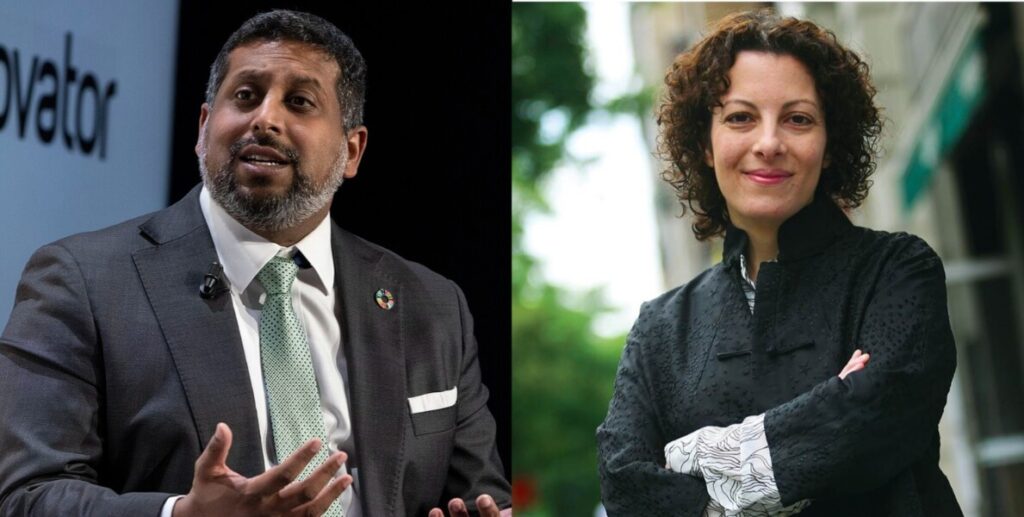Does our artificial intelligence future have to signal the end of opportunity for some — and (more) vast wealth for the few? Does it have to mean an end to human connection and citizenship? Or can it be a driver of positive change that solves some of our world’s greatest challenges — including threats to democracy — and makes government work better for all?
To civic activist and AI expert Vilas Dhar, president and trustee of the Patrick J. McGovern Foundation, the answer to those questions is clear. He explained in an interview with Scale AI last October:
I have a sense that the world can be a better place, that technology can really empower us to be our most creative, our most humane selves. But I’m also convinced that that won’t necessarily happen all by itself, that we have a shared responsibility to step into a world of technology and policy and actually bring our best selves to making decisions that protect our future for everyone.
That’s the work Dhar supports at the McGovern Foundation, a philanthropy that seeks AI and data solutions for a thriving, equitable and sustainable future. Dhar is a lawyer, entrepreneur, technologist, human rights advocate and a leader in the global push for equity in a world moving ever more rapidly towards an AI future. He will talk about his work to shape that AI future — along with Beth Simone Noveck, director of Northeastern University’s GovLab, at The Citizen’s 6th annual Ideas We Should Steal Festival presented by Comcast NBCUniversal on November 17. (Find out who else is coming here. Reserve your seat here.)
Dhar is an optimist who believes we already have the human ability and the desire to harness new technologies for good. As he told Scale AI:
The incentives for that come from a few different places: One is all of us as consumers and customers encouraging the businesses that are providing us products to think in these ways; it comes from us as democratically inclined citizens asking our governments to fund research and development into, particularly AI tools, that lead to positive social outcomes; and it comes through academics who are often at that front line of thinking about the broad ways in which technology being developed can be deployed for the public good.
Pushing public institutions — including city governments — to solve problems by combining better tech with better community engagement is the premise of Noveck’s GovLab, which has worked all over the world to demonstrate the power of well used data to create positive change. Noveck, who also teaches at Northeastern’s Institute for Experiential AI, was New Jersey’s first chief innovation officer, and served as the chair of that state’s Future of Work Task Force. She is writing a book about how AI can help to reboot democracy, something that requires effort from both citizens and government, as she said in an interview with the German Marshall Fund a couple years ago:
Governments are realizing that engaging with citizens is not a nice to have but a must have, and new technology can help to make it efficient as well as effective. Where people in the past have been very worried that engaging with citizens will just create more burden and lead to people screaming and complaining, what we are seeing is lots of examples of platforms — whether it’s Your Priorities out of Iceland or CitizenLab out of Belgium — that are being used to help cities engage with citizens in ways that help them solve problems more efficiently.
[…]
In the U.S., there hasn’t been a systematic adoption of citizen engagement efforts nationwide. What we’re seeing instead is scattered, with some cities and states adopting it and others not. I think the main thing to take away from all this is that citizen engagement is not just the right thing to do, but it also helps to achieve better outcomes than trying to solve problems behind closed doors. I think the big idea that cities are starting to catch on to is that citizen engagement helps government do its job better, rather than costing more time and effort.
Noveck and Dhar will explore the ways AI can create better citizens and better governments in conversation with Dalila Wilson-Scott, EVP and Chief Diversity Officer of Comcast Corporation and President of the Comcast NBCUniversal Foundation, at The Citizen’s Ideas We Should Steal Festival on November 17 at Comcast Technology Center.
Meet Vilas Dhar and Beth Simone Noveck at
the 2023 Ideas We Should Steal Festival presented by Comcast NBCUniversal
Friday, November 17
Ralph J Roberts Forum at Comcast Technology Center | 1800 Arch Street, Philadelphia
Correction: An earlier version of this story named a different moderator for this panel. The conversation will be led by Comcast’s Dalila Wilson-Scott.

